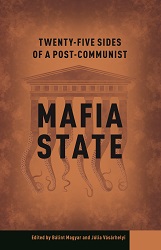
We kindly inform you that, as long as the subject affiliation of our 300.000+ articles is in progress, you might get unsufficient or no results on your third level or second level search. In this case, please broaden your search criteria.


The Fundamental Law, drafted in 2011 and instituted on 1 January 2012, was amended no less than five times over a year and a half.Hungary’s sitting prime minister since 2010 had formulated his intent to stay in power for an extended period of time in his state-of-the-nation speech delivered in Kötcse, as early as 9 September 2009. As well, he expounded the necessity of building a system of political institutions that could guarantee the realization of this plan, practically by establishing a one-party state. His idea of a “central field of power,” especially if designed for the long term, was neither reconcilable with democracy, nor with a multiparty system, let alone with the electoral law which was in force until 2010.
More...
Certain economic activities cannot be performed competitively from abroad, or at least not at a reasonable cost. Governments can abuse the low mobility of the companies performing these activities, extracting tribute from them through special taxes. These kinds of special taxes, however,are alien to market economies and are essentially unknown in Western Europe. Yet, Hungarian governments since the mid-2000s have discovered and experimented with the possibilities of tribute extraction. Since 2010,the Fidesz government has put itself into a difficult position with respect to increasing revenue by its odd tax cuts and rejection of appropriate cuts to public spending, and it has made the special tax tributes, which now generate nearly two and a half times more revenue than the standard corporate income tax, a key element of the tax system.
More...
Although, since 2001, the deep liquidity recession that followed the agrarian economy has been avoided and it appears that the wheels are in motion to ensure the constant renewal of farming processes, what is more, since joining the EU the proportion of total income in agriculture is growing, there are serious consequences to the fact that this income and the number of people living from agriculture barely makes up 40% of the income and population of the 1980s. The population of villages was seriously affected by the rationalization of the industry and the rapid growth of productivity: they were the first to become superfluous.
More...
The Western nature of the region, for the world on this side of the Iron Curtain, was exemplified by Hungary: leading European politicians from Helmut Kohl to Margaret Thatcher visited it then as often as Central Asian dictators do today.
More...
The historical memory of a society reflects its political situation. In the last two and a half decades, the political system radically changed in Hungary,and a reevaluation of the historical past is completely natural after such a change of regime. In a country where after 1945 the (first clandestine,but soon open) dictatorship of the Communist Party made any discussion of the past all but impossible, with the communist view of history being forced on the society, the years of the transition should have brought significant changes in symbolic memory. Yet, looking back on those years, it is surprising how little changed in the first decade after the regime change,and how much a decade later.The failures of the socialist–liberal government, the economic crisis, and the policy of Fidesz are all responsible for the renaissance of extreme rightwing ideas, though not to the same extent. What proved decisive is the elevation of a memory politics that is compatible with Jobbik to the status of state policy—a continuation, in fact, of the slogan “One camp, one banner.”This policy proved to be a success to a certain extent, as today the rightwing interpretation of history dominates in Hungarian society. This politics legitimizes figures who can only be despised in Western Europe. Far from being a temporary phenomenon, the radical shift is more and more marked in Hungary. Similarly to the situation in Poland, a social democratic renaissance is quite unlikely to happen in Hungary any time soon. Neither has the former state party any chance to return to power. As opposed to Poland, however, liberals have no chance either in Hungary—they are not even represented in the parliament any longer. For the time being, only Fidesz is capable of keeping Jobbik at bay. This, however, should not make us forget that there is no clear boundary line between the view of history of the two parties, a fact that is the result of Fidesz’s double-faced policy. Will there be anything to convince voters, fed by dangerous ideological fodder, to use their common sense, and choose a democratic option at the time of crisis and social conflict? The answer to this question is shrouded in obscurity.
More...
The media landscape, as it stands today, clearly hinders the formation of a thoroughly informed public opinion. One of key principles of the 1989 political changeover was to dismantle the information monopoly controlled by the regime. A quarter century after the fall of communism, Hungary is once again just a tiny step away from having a new, insulated media monopoly entirely serving the interests and satisfying the expectations of the ruling power.
More...
The lasting persistence of the political regime that came into being after 2010 required the neutralization of its opposition, that is, integration into the system. In a 2009 speech delivered in Kötcse, Viktor Orbán explained in unambiguous terms the kind of party relations he intended to create in the new regime replacing the democratic republic: The dual party system will end—in the following fifteen to twenty years a central field of power will evolve to define the political landscape. The hegemonic government party will monopolize power and formulate the national agenda to be upheld in a straightforward manner by precluding “unnecessary debates about values.” This hegemonic system maintaining the facade of parliamentarism is not be sustained by doing away with the opposition but by integrating it in a subordinate position, rendering it unsuitable to gain power as a player in a rotational party system.
More...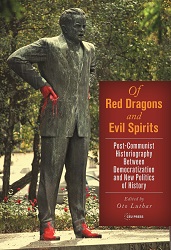
The following chapter focuses on the public memory of the recent past (World War II and its aftermath) in Bulgaria. Taking the joke seriously, I start with the constructivist assumption that the messages of the past do not spontaneously emanate from it, but rather are coined in the present to respond to current needs and interests. The past therefore “keeps changing” as a consequence of the politics of history that not only seek to negotiate the narratives about the past but also to legitimize social and political actors and their causes in the present. From this perspective, I will try to track down two simultaneous but diverging tendencies in the current Bulgarian memory constructs: what might be considered (re)nationalization of memory, and its Europeanization.
More...
World War II was the founding myth both for socialist Yugoslavia, based on the narrative of the supra-national partisan struggle, and for post-socialist Croatia, due to President Franjo Tuđman’s idea that both partisans and Ustasha had fought for the Croatian cause, albeit in different ways. How did this strong role of politics of history impact professional historiography and vice versa, what influence did the latter have? Does it make sense at all to speak of a Croatian historiography in socialist Yugoslavia—were there fields free of influence from socialist hegemonic narrative? This chapter argues that this is true for the conservative historiography before the 1960s, but also for the two currents that developed in this period: There was a growing tension between distinguished medieval studies and historians like Mirjana Gross, who established contacts with international experts, oriented themselves on new Western methodology, and promoted approaches of the Annales School on the one hand, and nationalist historians whose engagement seemed limited to verbal exchange about contemporary history with their Serbian counterparts on the other hand. This last current, represented by the later Croatian president Franjo Tuđman, became dominant after Croatia’s independence in 1991.
More...
As in many other former communist countries, a “competitive martyrdom” struggle erupted in Romania soon after the collapse of the former regime. By “competitive martyrdom” I understand the implicit or explicit attempt to exonerate the Romanian political community embodied by the state, or segments of that community, from either guilt or responsibility for having participated in World War II as a Nazi ally and from having perpetrated genocidal crimes against the Jews and the Roma. Coined by several scholars in the context of de¬bates around the extent, the limit or the desirability of emulating the alleged postwar denazification in Western Europe, competitive mar¬tyrdom is a complex issue, influenced not only by the immediate communist past and its treatment of the Holocaust in official history, but also, and above all, by socio-psychological factors linked to collective memory and to the social frameworks of the memory of specific groups within society. Furthermore, it entails also an international aspect, for the de-communizing polities strive to demonstrate their appurtenance to the democratic “international regime” and its values, but are obviously at pain when urged to confront collaboration.
More...
Here the author discusses the rise of this polarization of contemporary Slovak historiography, which was institutionalized in the 1990s, and still remains in the academic debates, and also as one of the constitutive elements in the public representations of history. The efforts to enforce a certain canonical interpretation of the past are not just a matter of politics or professionals. Academics often give it legitimacy or even create it, and are a part of the institutional networks involved in the dissemination of knowledge and ideas. Shared representations of the past are not accidentally produced by social groups, but are a consequence of cultural meditation, primarily of textualization and visualization
More...

In the following chapter, the author wants to show that the fear Andrić talked about can from time to time lull us into blindly believing those stories that know nothing about “perhaps” or “anticipation.” Or to put it more precisely, in discussing the straightforwardness of post-socialist revisionist historiography, he shows how hope in the uncensored interpretation of the past that accompanied the “end of communism” gave way to the fear of yet another strand of one-sided politics of history
More...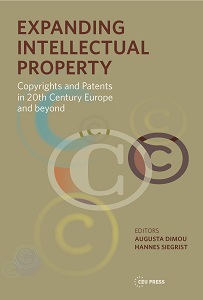
Property (in a generic sense) and intellectual property (an encompassing category for copyrights, patents and trademarks) are central elements of the institutional and constitutional order of modern cultures and societies. “Property” refers to a bundle of exclusive rights and entitlements which institutionalize (i.e., regulate) the usage, control and transfer of material and immaterial goods. Property rights define and institutionalize social relations between individuals, groups, organizations, and states in a particular mode, namely as property-based relations. They define and sanction a) the interaction between social actors and b) the relationship between a legal subject and a material or immaterial object. They institutionalize the cooperation, communication and competition among social actors such as entrepreneurs and workers, owners and nonowners, producers, mediators and users. They determine the allocation and usage of goods or assets such as land, buildings, technical equipment, financial capital, forms of expression and useful new technical knowledge. Thus, material and immaterial property rights belong to the broader category ofexclusive long-term rights, which are expected to stabilize social relations and hierarchies, to integrate societies and to regulate exchanges. The histories of material and immaterial property rights differ in some respects but are fundamentally connected and complementary. In the following chapter I will focus on the history of propertization (as well as de- and repropertization) in the spheres of information, cultural artifacts, symbols, forms of expression, and scientific and technical knowledge in the contexts of nationalization and globalization of cultural and economic relations. Propertization means that relationships between persons, organizations and objects are increasingly conceived and regulated as property-based relations. Because the meanings, functions and effects of intellectual property rights depend on the general social, cultural and institutional setting in which they are embedded, I will outline the history of intellectual property rights within the general history of culture, science, economy and politics. I will do this specifically by connecting the history of propertization with the histories of the nationalization and globalization of cultural relations. These three forms and strategies of institutionalization and organization are fundamental to an understanding of the dynamics of modern societies, economies and cultures. I will examine how these strategies have been combined at different times and in different places; and whether they hindered or consolidated one another. This will help us to explain, and subsequently understand, the history of the expansion of intellectual property rights.
More...
The research interest of the present analysis, therefore, lies in the specific interests of the various historical stakeholders. How and why were the regulations of the international copyright regimes linked to international policies of developmental aid? How did the negotiations between the early 1960s and the revision conference in Paris in 1971 impact on international copyright regimes? Is it valid to speak of their “politicization”? Are the negotiations between developing and developed countries, between private, public and state stakeholders in the respective period merely an episode within a larger process of IPR “expansion,” as postulated by some? And finally, what are the roles of national institutions and international epistemic communities within these processes? Cultural and social historians have only started analyzing IPR in the past few years. The period between 1945 and the 1990s has certainly been somewhat overlooked. This analysis intends to help fill the gap by taking a brief glance at the events and processes of the 1960s. It is roughly divided into three parts: The first part deals with a number of smaller meetings and conferences leading up to the revision conference in Stockholm in 1967. Part two will take a closer look at the constellations and conflicts revealed by that conference, while the third part discusses the short period leading up to the revision conference of 1971 in Paris, where interim compromises and dispositions in the disputes were inscribed into both the BC und the UCC. The year 1971, therefore, forms an initial hiatus in the development of international copyright regimes and serves as the focal point for this discussion.
More...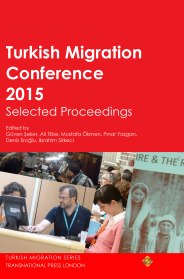
Migration is not a new phenomenon for Turkey. Before and after the foundation of the Republic, the country has received waves of migration but since the 1970s, migration dynamics of the country has been changing. Turkey has increasingly become a destination country for asylum-seekers and a transit country for irregular migrants. Mass influx of asylum-seekers and refugee movements in Turkey has originated mainly from its neighbours or former Ottoman territories. These movements have included Iranians, Turks of Bulgaria, Iraqis, Chechens, Bosniacs and very recently Syrians.
More...
Most migration scholars treat Turkey as a country of emigration, a transit route, and a country of immigration for migrants and refugees from Eastern Europe, the Middle East and Africa (Erzan & Kirişci 2008; Içduygu & Kirişci 2009) or a country of settlement of co-ethnic, second generation immigrants from western European countries. By contrast, the movement and settlement of EU nationals of non-Turkish descent has attracted attention only recently (Içduygu et al 2013: 3; OECD 2014), although the phenomenon lies at the intersection of key political, economic and institutional developments both in the EU and in Turkey itself (Tolay 2012; Linden et al 2012). Obviously, one of the crucial dimensions is the processes of political and institutional reforms in Turkey upon its preparation for EU membership and the impact of such changes on the rights, preferences and migration strategies of foreign nationals in general and EU citizens in particular (Içduygu et al 2013: 6-16). Furthermore, the migration of EU citizens to Turkey offers an alternative and yet undiscovered angle to view the recent rise of identity and ethnicity politics in the EU member-states (Hsu 2010), the fluid and variable geometry of European borders and identities (Del Sarto 2010), and the resulting formation of conceptions of “the other”, both in the EU and in Turkey.
More...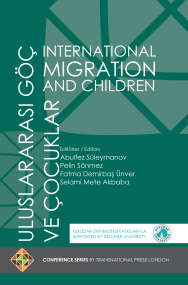
Günümüzde yaşanan ekonomik ve sosyal değişimler, kişilerin veya ailelerin doğdukları yerlerden ayrılmalarına neden olmaktadır. Özellikle ülkemizin bulunduğu bölgede uzun yıllardır süregelen savaşlar, can güvenliği nedeniyle, bölge halkının komşu ülkelere göçünü zorunlu kılmıştır. Bu göçlerden en fazla etkilenen ülkelerin başında Türkiye gelmektedir.
More...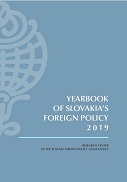
A year ago when reviewing the year 2018 in Slovak foreign policy on the Western Balkans I raised the question of whether it had been a lost year or a useful year. The answer was that while it had not been a breakthrough year, it should not be condemned either. Indeed, the European Commission had drafted a policy paper, “A credible enlargement perspective and enhanced EU engagement with the Western Balkans,” in which it stressed that EU membership was a “geostrategic investment in a stable, strong and united Europe based on common values.”
More...